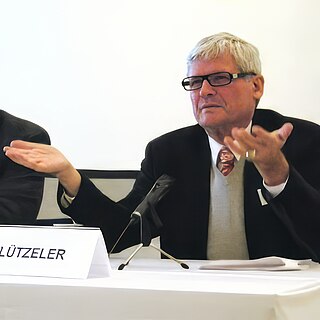Uwe Topper is a German amateur researcher and author of books about historic, ethnographic and anthropological subjects.

The global spread of the printing press began with the invention of the printing press with movable type by Johannes Gutenberg in Mainz, Germany c. 1439. Western printing technology was adopted in all world regions by the end of the 19th century, displacing the manuscript and block printing.
Since the 18th century Berlin has been an influential musical center in Germany and Europe. First as an important trading city in the Hanseatic League, then as the capital of the electorate of Brandenburg and the Prussian Kingdom, later on as one of the biggest cities in Germany it fostered an influential music culture that remains vital until today. Berlin can be regarded as the breeding ground for the powerful choir movement that played such an important role in the broad socialization of music in Germany during the 19th century.
The German Broadcasting Archive is a non-profit foundation supported by the ARD. It was founded in 1952 as "German sound archive". The DRA covers essential aspects of the development of German broadcasting. Today it has two locations: Frankfurt am Main and Potsdam-Babelsberg.

Paul Michael Lutzeler is a German-American scholar of German studies and comparative literature. He teaches as Rosa May Distinguished University Professor in the Humanities at Washington University in St. Louis.
Ernst Schnabel was a German writer and pioneer of the radio documentary (feature). From 1951 to 1955 he was director of the Nordwestdeutscher Rundfunk (NWDR).

Wolfgang Benz is a German historian from Ellwangen. He was the director of the Center for Research on Antisemitism of the Technische Universität Berlin between 1990 and 2011.
Centrum Schwule Geschichte e. V., abbreviated CSG, is a German "LGBT" organization based in Cologne (Köln).

The Lübeck Martyrs were three Roman Catholic priests – Johannes Prassek, Eduard Müller and Hermann Lange – and the Evangelical-Lutheran pastor Karl Friedrich Stellbrink. All four were executed by beheading on 10 November 1943 less than 3 minutes apart from each other at Hamburg's Holstenglacis Prison. Eyewitnesses reported that the blood of the four clergymen literally ran together on the guillotine and on the floor. This impressed contemporaries as a symbol of the ecumenical character of the men's work and witness. That interpretation is supported by their last letters from prison, and statements they themselves made during their time of suffering, torture and imprisonment. "We are like brothers," Hermann Lange said.

Carmen Thomas is a German journalist, radio and television presenter, author and lecturer. On television, she was the first woman to present the ZDF's das aktuelle Sportstudio. She worked for public radio, running Hallo Ü-Wagen, a weekly travelling talk radio show for two decades. In 1990 Forbes named her one of the 100 most influential women in Germany.
The German Historical Institute in Rome, short DHI Rome, is the oldest of the German historical institutes abroad. Its purpose is to conduct research in the history of both Italy and Germany, and investigate particularly the German-Italian relations in a wider international context from medieval times to the present day.
Michael Lorenz is an Austrian musicologist, music teacher, musician, chess historian and photographer, noted as a Mozart scholar and for his archival work combining music history and genealogical research.

Aleida Assmann is a German professor of English and Literary Studies, who studied Egyptology and whose work has focused on cultural anthropology and Cultural and Communicative Memory.
Gilad Margalit was an Israeli historian and writer, and a professor in the Department of General History at the University of Haifa.
Michael Scheffel is a professor for the history of modern German literature and more generally of Literary sciences at Wuppertal University. He is also a co-editor of Text + kritik.

BWV Anh., abbreviation of Bach-Werke-Verzeichnis Anhang, is a list of lost, doubtful and spurious compositions by, or once attributed to, Johann Sebastian Bach.
Hans-Joachim Schulze is a German musicologist, a Bach scholar who served as the director of the Bach Archive in Leipzig from 1992 to 2000. With Christoph Wolff, he was editor of the Bach-Jahrbuch from 1975 to 2000. He published an introduction to all cantatas by Johann Sebastian Bach in 2006.
Norbert Frei is a German historian. He holds the Chair of Modern and Contemporary History at the University of Jena, Germany, and leads the Jena Center of 20th Century History. Frei's research work investigates how German society came to terms with Nazism and the Third Reich in the aftermath of World War II.
Hans Joachim Marx is a German music historian. He has been professor for European music history at the University of Hamburg.







